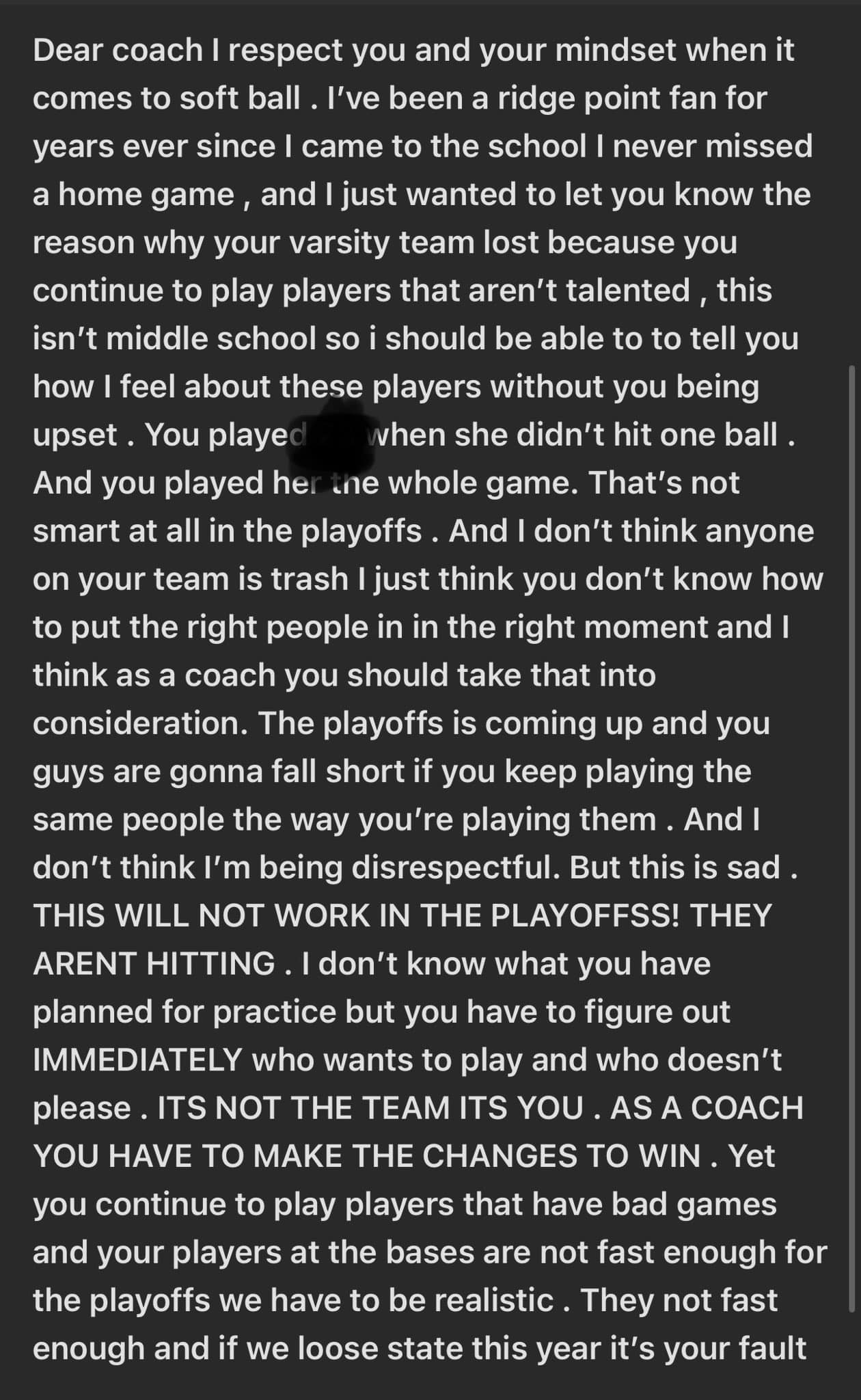[ad_1]
Any teacher with more than two decades of experience will tell you: 2023 is a whole different ball game.
It can be hard to pin down the myriad of reasons why. But recently, a letter posted by Jasone Pearce Media did a pretty good job of summing up how we’re viewed by the public.
This email—it’s unclear whether it’s from a parent or a “fan”—was sent to the softball coach at Ridge Point High School on a Sunday morning after a loss the previous night. Ridge Point, which until that loss had maintained a 20-6 win record, clearly has a very strong softball program. But not according to the writer of this email. Check it out for yourself:

I really feel for this coach. Anyone familiar with coaching will tell you that it’s a job that demands a ton of time, emotional intelligence, and strategy. Combine coaching and teaching and you have two highly demanding jobs that people are slow to praise and quick to blame (remember the whiplash of 2020 when we went from being heroes to groomers?).
Here’s why this email encapsulates the teaching experience in 2023.
The people on the sidelines think they’re the expert.
I don’t know how this happened, but we have an astounding number of adults who think that observing something endows them with the ability, permission, and expertise to critique it. Clearly, the writer of this email assumes that being a fan who has “never missed a home game” has bestowed upon them coach-level knowledge. You know, the same way that watching Grey’s Anatomy makes you a surgeon.
It doesn’t matter how skilled you are—so many parents and community members see you as subordinate to their whims.
This coach had a 20-6 winning record prior to the previous night’s loss. Twenty winning games isn’t just a pretty good record, it’s stellar. But that didn’t matter for the writer of this email. One loss put the writer in a position to coach the coach.
In the same way, even the greatest teachers are subject to ridiculous expectations, scrutiny, and hostility. I can think of dozens of teachers I know—teachers who I would handpick to teach my child—who are losing valuable prep time and mental bandwidth dealing with parents who will stop at nothing in getting what they want. In an open letter to parents from National Teacher of the Year Rodney Robinson in 2020, he reminds parents to “model the behavior you want your children to emulate.” Clearly, even the best teacher in the nation isn’t a stranger to bad parent behavior.
Their perception is reality.
“I don’t think I’m being disrespectful.”
“I just think you don’t know how to put the right people in in the right moment.”
“I just wanted to let you know the reason why your varsity team lost. …”
There’s no invitation for collaboration. No room for being wrong. No acknowledgment of expertise or questions about strategy. It’s “I decided why you lost, I know more than you, and I’m going to assume you want me to tell you.” (Side note: I’m so curious what the writer envisioned when the coach opened his email. Gratitude? “Oh, wow! I had no idea why we lost, but thank goodness our fan who’s never missed a home game decided to tell me!”)
This email highlights a situation teachers find themselves in all the time: There’s no room for dialogue when a parent’s perception is their automatic reality.
It highlights how teaching has become a customer service industry.
In recent years, there’s been a big shift in the role of families in schools. What was once a place where teachers, administrators, coaches, and staff could offer their professional opinion in collaborating with families, it’s now a place where parents can march in with a list of demands for their child. In many places, teaching has become an industry to serve parents rather than an educational institution to serve children. Alexandra Robbins says it this way in her book, The Teachers:
“Parents’ mistreatment of teachers has accompanied an increasingly pronounced ‘us-versus-them’ mentality. Instead of welcoming teachers with a cooperative ‘It takes a village’ mentality to educate and nurture their children, many parents view teachers as obstacles or hurdles to barrel through between childhood and graduation.”
Did the email writer see the coach as nothing more than a hurdle between Ridge Point and the playoffs? Hard to say.
Inevitably with an article like this, I’ll eventually hear the flip side of my point staged as the only alternative. “So, what? Are you proposing that parents be silent? That no one can have an opinion apart from a coach or teacher?”
Of course not. Parents and community members absolutely deserve a place and a voice in schools. Where we’ve gone wrong is making their voice the only voice.
What are your thoughts on this email? Please share in the comments.
Plus, for more articles like this, be sure to subscribe to our newsletters.
[ad_2]
Source link

